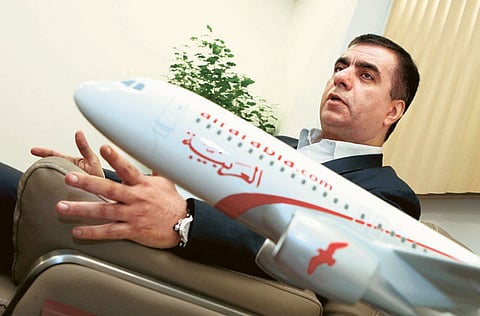Air Arabia expects a profitable 2012: CEO
Sharjah-based budget carrier puts on hold its operational hub in Jordan

Dubai: Continuing its ability to deliver profits year after year, Air Arabia expects a profitable 2012 despite industry challenges that lie ahead, according to its top executive.
The Sharjah-based budget carrier said on Saturday it recorded a full-year net profit of Dh274 million in 2011, down 11 per cent from the previous year's Dh309.559 million.
Asked what 2012 holds for the region's biggest budget carrier, Adel Ali, chief executive, told Gulf News in a phone interview: "We have got to put a few things into perspective. We've budgeted for a profit every year. We will have to go for a profitable year, but the year carries a lot of things."
Cost controls
Without divulging exact numbers for the year, he said: "It's too early to say and 2012 is a year that's very difficult to predict and an ambiguous one because the political instability in the region continues to take shape and oil prices are probably record high in the last two years. Having said that, our seat factor continues to be good. So we are aiming for a good year."
He added that January proved to be a good month owing to school holidays, the Dubai Shopping Festival and other market factors. "All that contributed to the business," said Ali.
Tight cost controls helped Air Arabia's net profit inch up 7 per cent in the fourth quarter of 2011 to Dh78.7 million against Dh73.6 million in the same period a year earlier.
Operating to around 70 destinations from its three hubs in the UAE, Morocco and Egypt, Air Arabia's 2011 seat load factor was 82 per cent. But market forces are forcing the airline into delaying the launch of its long-planned Jordan hub even further. Air Arabia deferred plans for the fourth hub earlier this year owing to geopolitical tensions in the region and high fuel prices.
"We will revisit that [Jordan hub possibility] when there is complete stability in the region and the economic conditions in Europe as well as globally settle down.
"One of the reasons for us to have a hub in Jordan was it would have given us a better link into Europe, and I don't need to explain the condition of the European economy at this point of time," Ali said. "So the reasons that we shelved the Jordan hub remain unchanged at the moment."
Unique position
Competing with Dubai-based flydubai, Air Arabia sees AirAsia's recent statement about possibly launching a budget carrier in the Middle East as no threat.
"I must say that Air Arabia enjoys quite a unique position. I can't see Air-Asia setting up its [regional] hub — if it does ever — in Sharjah. So that alleviates any concerns of a competition threat from AirAsia in the region.
"And then there are a lot of airlines in this region, so whether you add one more or take one away, it's not going to change our focus and strategy of doing business."
Airfare increase
Asked if the airline planned to increase its fares in 2012 under the pressure of rising fuel prices, Ali said: "Fuel prices have been very unstable. One has to wait and watch for them to somewhat stabilise in order to make those judgements. Naturally, if they continue to rise, then airlines will have no choice but to put a special fuel surcharge in."
He added: "As far as Air Arabia is concerned, as of today we have no plans to introduce such a surcharge.
"But we will continue to monitor the fuel price movement closely. And if it continues to escalate, then the whole air transport industry will add the surcharge."
Furthermore, 25 per cent of Air Arabia's fuel costs are hedged for 2012, according to Ali.



